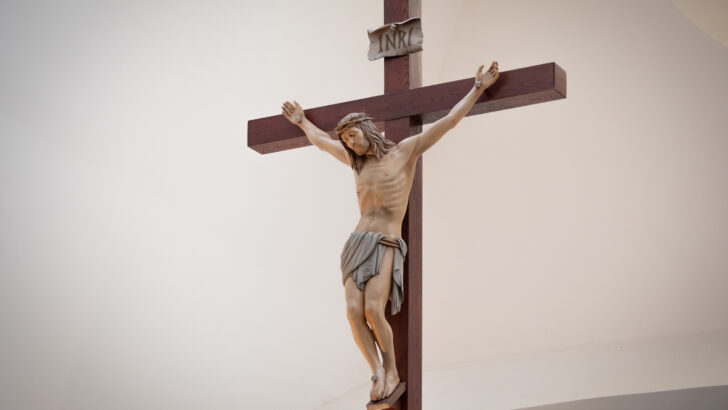Among the religious authorities of Jerusalem, not only were the Pharisee Nicodemus and the prominent Joseph of Arimathea both secret disciples of Jesus, but there was also long-standing dissension about him, so much so that St John says of these authorities on the very eve of Christ’s Passion, “many believed in him”, though very imperfectly.
The historical complexity of Jesus’ trial is apparent in the Gospel accounts. the personal sin of the participants (Judas, the Sanhedrin, Pilate) is known to God alone. Hence, we cannot lay responsibility for the trial on the Jews in Jerusalem as a whole.
In her Magisterial teaching of the faith and in the witness of her saints, the Church has never forgotten that “sinners were the authors and the ministers of all the sufferings that the divine Redeemer endured.”
Redemptive death
Jesus’ violent death was not the result of chance in an unfortunate coincidence of circumstances but is part of the mystery of God’s plan.
To God, all moments of time are present in their immediacy. When therefore he establishes his eternal plan of “predestination”, he includes in it each person’s free response to his grace. For the sake of accomplishing his plan of salvation, God permitted the acts that flowed from their blindness.
The Scriptures had foretold this divine plan of salvation through the putting to death of “the righteous one, my Servant” as a mystery of universal redemption, that is, as the ransom that would free men from the slavery of sin. Indeed, Jesus himself explained the meaning of his life and death in the light of God’s suffering Servant.
Man’s sins, following on original sin, are punishable by death. By sending his own Son in the form of a slave, in the form of a fallen humanity, on account of sin, God “made him to be sin who knew no sin, so that in him we might become the righteousness of God.” By giving up his own Son for our sins, God manifests that his plan for us is one of benevolent love, prior to any merit on our part.
The offering
The Son of God, who came down “from heaven, not to do (his) own will, but the will of him who sent (him)”, and by that will we have been sanctified through the offering of the body of Jesus Christ once for all.” From the first moment of his Incarnation the Son embraces the Father’s plan of divine salvation in his redemptive mission. The sacrifice of Jesus “for the sins of the whole world.”
Christ’s whole life expresses his mission: “to serve, and to give his life as a ransom for many.” In suffering and death his humanity became the free and perfect instrument of his divine love which desires the salvation of men. Indeed, out of love for his Father and for men, whom the Father wants to save, Jesus freely accepted his Passion and death.
Jesus gave the supreme expression of his free offering of himself at the meal shared with the twelve Apostles “on the night he was betrayed”. Jesus desires to associate with his redeeming sacrifice those who were to be its first beneficiaries. Apart from the cross there is no other ladder by which we may get to Heaven.
From paragraphs 591-618


 Renata Milán Morales
Renata Milán Morales
